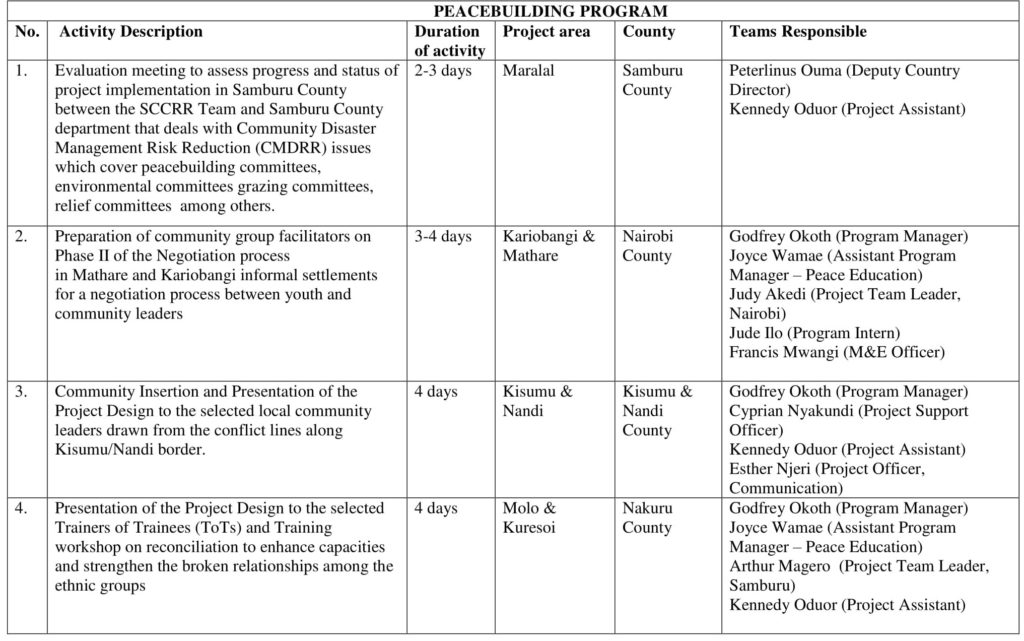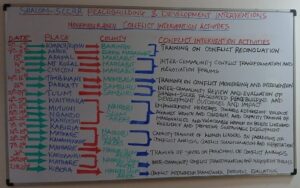Shalom’s approach of applying theory, analytical findings, and practice towards transforming violent conflict in Kenya through peacebuilding and development processes is ongoing. SCCRR progressively initiates a broader and more inclusive process of non-violent conflict transformation. The main aim of this strategy is to empower middle range leaders (Track II: who are the county government representatives; religious leaders; community based organizations officials and police officers) and grassroots stakeholders (Track III: who are the youth representatives, women leaders, village elders, kraal leaders, chiefs and representatives from the various peace committees) so as to achieve a sustained reduction of violent conflict and poverty across various counties in Kenya. SCCRR is also committed in assisting the Track II level of conflict management to support, encourage and learn from the peacebuilding efforts of the local communities in Track III.
In the month of September, SCCRR activities are focused in facilitating interactions between the two tracks or levels (Track II and Track III) by initiating and strengthening spaces for dialogue and building trust among the levels. These activities are informed by the ongoing research by SCCRR’s vigorous research department on the identification of the underlying causes of the recurrent incidents of violent conflict among the pastoralist communities.
Find the details of our September 2018 activities in the elaborate schedule below:
1. PEACEBUILDING PROGRAM


2. PEACE DEVELOPMENT PROJECTS
In our Peace Development Projects this month, SCCRR’s is focusing ON the completion of projects started last month in the nine (9) interethnic and interreligious schools which includes;
I. In Samburu County; Lareorok Primary School, Marti Mixed Secondary School, Girgir Primary School and Simale Primary School
II. In Turkana County; St. Andrew Nayanae Kabaran ECD, Kokuro Primary School and Loya Primary School.
III. In West Pokot; Turkwel Gorge Mixed Secondary School
IV. In South Sudan; St. Josephine Bakhita Girls Secondary School
Among the nine projects in these nine schools, eight are complete and materials handed over to respective schools while one is still on going and scheduled to be complete by the end of the month. Through our projects, we have helped these communities in conflict and poverty environments to build and renovate their classrooms, supplied them with solar lighting systems and their accessories, provided them with text books and other teaching and learning materials such as desks, tables and chairs AS well as establishing water and sanitary facilities for girls and boys.
These projects are tailored to foster peace by encouraging enrolment and retention in the target schools thus significantly providing better career options instead of being forced into early marriages, female genital mutilation and livestock rustling practices that are rampant in the Northern part of Kenya.
Our gratitude goes to the very skilled Shalom team, supplemented by the frequent expert advice from Fr. Patrick Devine and the management expertise from Fr. Oliver Noonan. The unwavering commitment and skillful expertise of the team that are working towards the implementation of Shalom’s program is contributing immensely towards community empowerment, to a degree that cannot be compared.
On behalf of the Shalom team, we like to thank all of you who tirelessly support this noble course by making it possible for all of us here to support the peacebuilding and development efforts among the conflicting communities in Kenya and beyond.
By SCCRR Program Management Team & Peace Development Officer:
Godfrey Okoth Onyango, BA, MA, Program Manager
Joyce Wamae Kamau, BA, MA, Assistant Program Manager, Peace Education and Development
Paulson Tadeo Erot, BA, MA, Assistant Program Manager, Peacebuilding Program
Austin Ngacha, BA, MA, Program Officer (Peace Development Projects)

